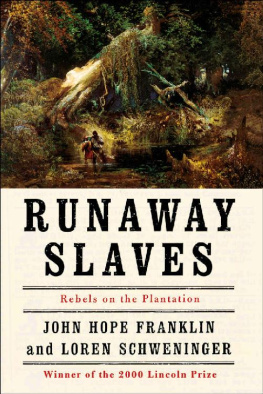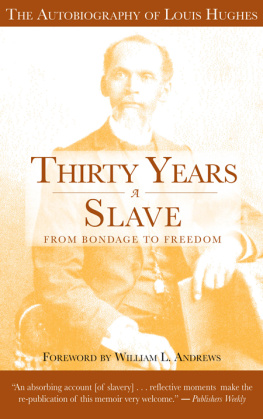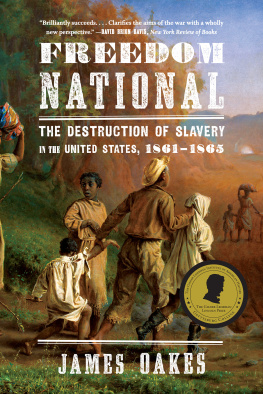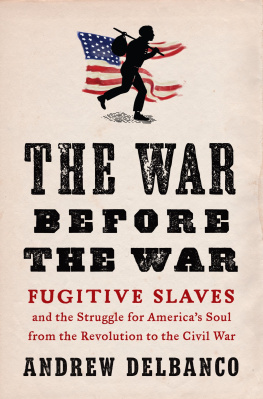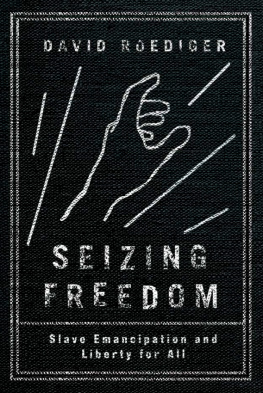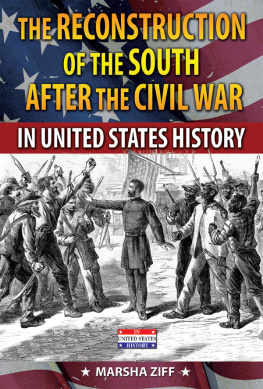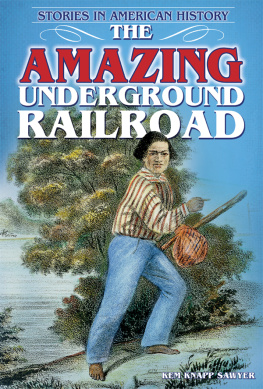John Hope Franklin and Loren Schweninger - Runaway Slaves: Rebels on the Plantation
Here you can read online John Hope Franklin and Loren Schweninger - Runaway Slaves: Rebels on the Plantation full text of the book (entire story) in english for free. Download pdf and epub, get meaning, cover and reviews about this ebook. year: 2000, publisher: OUP Canada, genre: History / Science. Description of the work, (preface) as well as reviews are available. Best literature library LitArk.com created for fans of good reading and offers a wide selection of genres:
Romance novel
Science fiction
Adventure
Detective
Science
History
Home and family
Prose
Art
Politics
Computer
Non-fiction
Religion
Business
Children
Humor
Choose a favorite category and find really read worthwhile books. Enjoy immersion in the world of imagination, feel the emotions of the characters or learn something new for yourself, make an fascinating discovery.
- Book:Runaway Slaves: Rebels on the Plantation
- Author:
- Publisher:OUP Canada
- Genre:
- Year:2000
- Rating:3 / 5
- Favourites:Add to favourites
- Your mark:
- 60
- 1
- 2
- 3
- 4
- 5
Runaway Slaves: Rebels on the Plantation: summary, description and annotation
We offer to read an annotation, description, summary or preface (depends on what the author of the book "Runaway Slaves: Rebels on the Plantation" wrote himself). If you haven't found the necessary information about the book — write in the comments, we will try to find it.
Runaway Slaves: Rebels on the Plantation — read online for free the complete book (whole text) full work
Below is the text of the book, divided by pages. System saving the place of the last page read, allows you to conveniently read the book "Runaway Slaves: Rebels on the Plantation" online for free, without having to search again every time where you left off. Put a bookmark, and you can go to the page where you finished reading at any time.
Font size:
Interval:
Bookmark:
RUNAWAY SLAVES
REBELS ON THE PLANTATION
John Hope Franklin Loren Schweninger


Oxford New York
Athens Auckland Bangkok Bogot Buenos Aires Calcutta
Cape Town Chennai Dar es Salaam Delhi Florence Hong Kong Istanbul
Karachi Kuala Lumpur Madrid Melbourne Mexico City Mumbai
Nairobi Paris So Paulo Singapore Taipei Tokyo Toronto Warsaw
and associated companies in
Berlin Ibadan
Copyright 1999 by John Hope Franklin and Loren Schweninger
First published by Oxford University Press, Inc., 1999
198 Madison Avenue, New York, New York 10016
First issued as an Oxford University Press paperback, 2000
Oxford is a registered trademark of Oxford University Press
All rights reserved. No part of this publication may be reproduced,
stored in a retrieval system, or transmitted, in any form or by any means,
electronic, mechanical, photocopying, recording, or otherwise,
without the prior permission of Oxford University Press.
Library of Congress Cataloging-in-Publication Data
Franklin, John Hope, 1915
Runaway slaves : rebels on the plantation/
John Hope Franklin and Loren Schweninger.
p. cm.
Includes bibliographical references (p. ) and index.
ISBN-13 978-0-19-508451-1 (Pbk)
1. SlaverySouthern StatesInsurrections, etc. 2. Fugitive
slavesSouthern StatesHistory. 3. Southern States
History17751865. I. Schweninger, Loren. II. Title.
E447.F7 1999 975.00496dc21 98-25230
Printed in the United States of America
on acid-free paper
For Aurelia and
Patricia, always there
I felt assured that, if I failed in this attempt, my case would be a hopeless oneit would seal my fate as a slave forever. I could not hope to get off with anything less than the severest punishment, and being placed beyond the means of escape. It required no very vivid imagination to depict the most frightful scenes through which I should have to pass, in case I failed. The wretchedness of slavery, and the blessedness of freedom, were perpetually before me. It was life and death with me.
Frederick Douglass
Appendix 1
Newspaper Advertisements
Appendix 2
Petitions to State Legislatures and County Courts
Appendix 3
Location and Possible Destinations of Runaways Cited in the Nashville Whig, 18121816
Appendix 4
Location and Possible Destinations of Runaways Cited in the Tennessee Republican Banner (Nashville), 18401842
Appendix 5
Damages Sought by Henry Crane for Runaway Lewis, 1851
Appendix 6
Correspondence
Appendix 7
Runaway Slave Database: Early Period 17901816; Late Period 18381860
OVER THE YEARS, plantation slavery has been described in many ways. Perhaps the classic description was provided by Ulrich B. Phillips. In his Pulitzer Prize-winning Life and Labor in the Old South, he spoke of the plantation force as a conscript army and the plantation as a homestead, a school, a parish, or perhaps a chapel of ease, a pageant and variety show, and a matrimonial bureau. Soon historians, including James Hugo Johnston, Harvey Wish, Raymond A. and Alice H. Bauer, and Herbert Aptheker, began to show that there was another way to view slavery. It was becoming clear that the plantation was not the smooth, well-managed operation described by Phillips. Missing from his romantic description were the harsh realities of everyday plantation life, the severe punishments for dereliction of duties, branding, mutilation, stealing, arson, murder, rape, and division of families, including the sale of children. No discussion of plantation life can be complete without a discussion of these and similar matters.
Some forty years ago, Kenneth M. Stampp succeeded in correcting earlier descriptions of plantation life such as those set forth by Phillips. He called slaves a troublesome property and reminded his readers of the unrest and unhappiness that were all too prevalent even among the most passive slaves. In turn, they retaliated against unreasonable demands by refusing to obey or even running away.
The revisionist trend was not altogether in one direction. In 1959, the psychological model presented by Stanley Elkins in Slavery: A Problem in American Institutional and Intellectual Life portrayed slaves as not unlike Jewish inmates in concentration camps during World War II. In order to survive they developed childlike, loyal, and docile dispositions. Eugene Genovese, among others, found Elkinss model disturbing. He noted that we must recognize that all psychological models may only be used suggestively for flashes of insight or
Meanwhile, pursuing his own line of inquiry, Larry Gara looked at the myths surrounding the Underground Railroad. Although the Underground Railroad was a reality, Gara said, much of the material relating to it belongs in the realm of folklore rather than history. It was not, he asserted, a well-organized transportation system offering multitudes of slaves safe passage to the Promised Land of freedom. Indeed, most runaways remained in the South, few were aided by abolitionists or anyone else, and many fled with a sense of terrible urgency.
In the decades that followed, a large number of books and articles about slavery appeared. During the 1970s most of the literature focused on black culture and black consciousness and on slave communities and slave family life. Some of these authors argued that the emergence of a unique African American cultureextended kinship systems, folk tales, spirituals, Afro-Christianitywas an important vehicle for resisting slavery. Only a few of them discussed the importance of runaways. John Blassingame, for example, dedicated a chapter in his seminal study The Slave Community to rebels and runaways, and Gerald W. Mullin broke new ground in Flight and Rebellion with an imaginative use of runaway advertisements.
Despite the large number of books and articles touching on the subject, there is still no full-length study of runaway slaves. In fact, much of the scholarship about slave resistance continues to be dominated by the conceptual framework and the focus presented by Herbert Aptheker more than a half-century ago: The Machinery of Control, Early Plots and Rebellions, The Turner Cataclysm and Some Repercussions, and The Civil War Years. Perhaps no book has exercised such dominion over a subject of prime importance, Genovese writes, as American Negro Slave Revolts. Peter Kolchin recently observed, however, that Aptheker probably exaggerated the extent of slave unrest. He lamented that there is still no adequate study of slave resistance or slave flight.
We have undertaken an extensive examination of slave flight between 1790 and 1860. It reveals, among other things, some problems of management of the Souths peculiar institution. It shows how a significant number of slaves challenged the system and how the great majority of them struggled to attain their freedom even if they failed. The price they paid for their unwillingness to submit was obviously enormous. This study reveals how slave owners marshaled considerable effort to prevent the practice of running away, meted out punishments to slaves who disregarded the rules, and established laws and patrols to control the movement of slaves. It also exposes the violence and cruelty that were inherent in the slave system. Indeed, it shows, perhaps better than any other approach, how slaves resisted with various forms of violence and how slave owners responded, at times brutally, to demonstrate their authority over their human chattel.
Next pageFont size:
Interval:
Bookmark:
Similar books «Runaway Slaves: Rebels on the Plantation»
Look at similar books to Runaway Slaves: Rebels on the Plantation. We have selected literature similar in name and meaning in the hope of providing readers with more options to find new, interesting, not yet read works.
Discussion, reviews of the book Runaway Slaves: Rebels on the Plantation and just readers' own opinions. Leave your comments, write what you think about the work, its meaning or the main characters. Specify what exactly you liked and what you didn't like, and why you think so.

